Intro to Any Great Book

All classic literature aims at answering the Question, “What does it mean to be human?” Authors who agree on nothing else are nonetheless of one mind when it comes to the need to answer this Question. All great literature is born from some troubling of the mind, for the Question, “What does it mean to be human?” is a vexing, awful question to ask. The Question obviously implies the answer is unknown. We do not know what it means to be human. What is worse, the Question itself implies the Question may be the wrong one to ask. If we do not know what it means to be human, perhaps the answer to “What does it mean to be human?” is inconsequential. However, upon waking to consciousness, no man immediately asks, “What does it mean to be human?” The Question does not satisfy the need to go back to the source. The Question is not the first realization of man. “What does it mean to be human?” is a question born out of a prior realization, and that realization is, Something is not right.
Something is not right is a realization born out of a man’s discontent. He can imagine a greater state of being than the one he has, and this greater state of being seems to be obtainable. He will write a book to determine if this greater state of being is actually obtainable. Why is he not perfectly content? His discontent may come from acting according to bad principles and beliefs. Or, he may have the right beliefs, and yet not act in accord with those right beliefs. Or his beliefs and his actions may both be wrong. When a man realizes he is unhappy, he must ask, “Is this unhappiness consistent or inconsistent with my beliefs? Do I believe the right things? Do I do the right things? If I changed what I do, would I be happy? If I changed what I believe, would I be happy? Am I doing and believing all that is necessary for happiness, and yet my unhappiness derives from bad luck which is beyond my control? Should I expect to be happy given what I believe and what I do? Is it unusual that I am unhappy? Or do I believe the right things and do the right things, and yet this world is such that right belief and right action simply do not make a man content?”
Great literature is born out of self-awareness, and a man’s self-awareness is simply the recognition that he is a character in a story and that he is not the main character. Further, the self-aware man realizes that he is not a particularly happy character, other characters often appear to be much happier than he, and so he writes a book to figure out whether they are actually happier or not. Roger Scruton notes in his Very Short Introduction to Beauty that judgements of beauty are almost always born of comparisons. This painting is more beautiful than that painting. Our judgements are, try as we might, almost never derived from holding a single thing up to an ideal and divine standard. We simply do not know the divine well enough to compare anything with it directly. So, too, questions of ethics and morality and human happiness are born out of comparisons. “Some people seem very happy. Am I as happy as that man? Should I be? Should that man be happier than I given the way he lives?”
This is not to say that beauty and goodness are relative, for in judging one thing to be more beautiful than another, we are yet using some pale, vague intuition of the Divine to weigh the two. The comparison of two things is a way of silently invoking God to stand between them. One object can only be judged heavier than another with a scale, and God is the scale which declares one man happier than another, one painting more beautiful than another, one witness more lucid than another. Classic literature is literature which, to some degree or another, has faithfully invoked God to judge.

Joshua Gibbs
Joshua Gibbs teaches online classes at GibbsClassical.com. He is the author of How To Be Unlucky, Something They Will Not Forget, and Blasphemers. His wife is generous and his children are funny.










